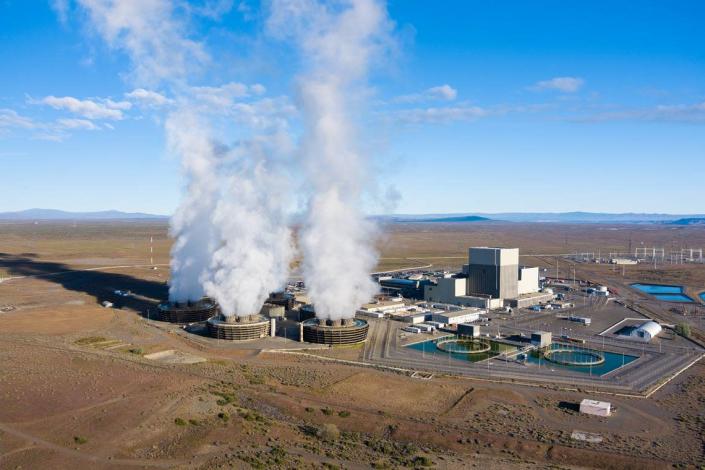Energy Northwest of Richland is the first commercial nuclear power producer to sign up to potentially buy recycled nuclear fuel from Curio, a small startup company.
Now other nations, such as France, with nuclear power programs recycle spent nuclear fuel, but not the United States.
Instead, nuclear fuel is pulled out of commercial power plants after several years of use and stored until the nation has a national repository for it.
Curio, based in Washington, D.C., plans the nation’s first plant to recycle spent nuclear fuel from commercial nuclear fuel plants to produce new nuclear fuel, plus other products.
Recycling used low-enriched uranium fuel “would represent a game-changing development for the future of the commercial nuclear energy industry,” said Bob Schuetz, chief executive of Energy Northwest.
Energy Northwest owns and operates the Columbia Generating Station, just north of Richland, Wash. It is the only commercial nuclear power plant in the Northwest.
Outside the plant on a concrete pad in a secure area are 54 concrete and steel casks — each 19 feet tall and 11 feet in diameter — holding spent fuel that dates back to when the plant began operating in 1984.
The used nuclear fuel was supposed to go to a national repository at Yucca Mountain, Nev. But with no plans to proceed with that project, the United States continues to look for a site for a repository for spent nuclear fuel that comes from all of the nation’s commercial power plants plus some Hanford nuclear reservation fuel.
“Yesterday’s nuclear waste is holding back tomorrow’s reactors,” said Edward McGinnis, chief executive of Curio and the Department of Energy’s former acting assistant secretary of nuclear energy for 2 1/2 years.
The nation now has nearly 95,000 tons of spent nuclear fuel with no path forward and about 2,200 tons being added each year.
Energy Northwest alone has paid $100 million in fees since 1983 to DOE for pending national disposition of the spent fuel.
Opponents of nuclear energy often cite the nation’s lack of a disposal site for used nuclear fuel as a reason not to expand production.
This article was originally published on Yahoo News.

